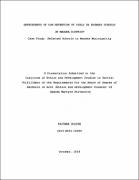Antecedents of low retention of girls in primary schools in Masaka District
Abstract
This study examined the antecedents of low retention of girls in primary schools with a case study of selected schools in Masaka municipality. The study had three specific objectives: identifying personal factors contributing to the low retention of girls in primary schools, explaining family/society grown factors and finding the school grown factors for the low retention of girls in primary schools. A case study design and a qualitative research approach design that described the deeper insights of low retention. The research took a sample size of 42 respondents using accidental and purposive techniques. The data collection methods used included interviews, focus group discussions and observation. The study found out that personal factors contributing to the low retention of girls in primary schools include; polygamous fathers who may not be in position to pay school fees for all children, child labor most commonly by step parents that has made many run away from their homes, early/forced marriages, long distances from school, lack of value for education by parents and many others are some of the personal-grown factors for the low retention of girls. The home/society grown factors included; family background, size of one’s family, kind of punishments given to children while at home, large number of dependents a particular home has, low/ small source of income, education level of the parents, society morals and the family’s main activity. The last objective concluded that; the attitude of some teachers being an antecedent for the low retention, discipline of some pupils, distance from school and some parents not in position to pay for the transportation of their children, early pregnancies, the kinds of punishments given to the children while at school, some parents just decide to put their children out of school, low attitude, some children suffer from certain diseases that make them feel inferior, ignorance about education and the age at which some girls join school. The recommendations include; the need to put more emphasis at the lower level of education, need for parents to create more time for their children than leaving them for the maids, need to follow up funds set for the UPE schools, need to equip primary schools in rural areas with basic necessities, teachers’ need to emphasize more practical subjects such that pupils are always occupied than having to act otherwise, train teachers better in their profession, need for teachers and parents to live exemplary life styles such that children can emulate from them and finally pupils of school-going age should also be motivated in different aspects to ensure that they keep in school.


